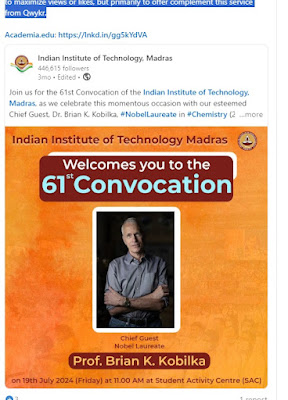Hello readers,
Today, I’m excited to share a personal highlight from my journey that left a significant mark on my academic path: a memorable encounter with Nobel Prize-winning chemist Prof. Brian Kobilka during my time at Stanford University (2011-2015). Prof. Kobilka's groundbreaking work on G-protein-coupled receptors continues to influence cell signaling research and therapeutic advancements worldwide, and our conversation was a profound learning experience.
During our meeting, I had the chance to share insights from my research paper on modernizing the Tamil script. This project focuses on enhancing the script’s accessibility and adaptability, not only to foster multilingual understanding but also to benefit the hard of hearing and hearing-impaired communities. It was incredibly rewarding to discuss my vision with Prof. Kobilka, and I left inspired to continue advocating for the linguistic inclusivity that this project promotes.
I’ve now shared the paper on Academia.edu for anyone interested in a deeper dive into the proposed changes to the Tamil script. Feedback is always welcome, and I’d love to hear your thoughts on this initiative. For those interested in following my updates, you can connect with me on my secondary LinkedIn profile. Besides academic discussions, I also share culinary insights, recipes, and cooking class opportunities. In fact, as part of Qwykr Technologies, we are currently offering free cooking classes for veterans of the U.S. Armed Forces—a small token of appreciation for their service.
This post marks another entry in my QwykrKudos journey, capturing moments of encouragement, learning, and collaboration. Thanks for joining me on this path!
[~]
🌟 Reflecting on a Memorable Encounter with Prof. Brian Kobilka 🌟|
I am thrilled to share a personal highlight from my time at Stanford University (2011-2015), where I had the incredible opportunity to meet Prof. Brian Kobilka, Nobel Prize winner in Chemistry. Prof. Kobilka's groundbreaking work on G-protein-coupled receptors has had a profound impact on our understanding of cell signaling and therapeutic advancements.
During our meeting, I had the chance to discuss my research paper on modernizing the Tamil script with him. My talk with him was both enlightening and encouraging, and our conversation left a lasting impression. For those interested, I have now shared this paper on Academia.edu. It explores proposed changes to make Tamil more accessible and adaptable, reflecting ongoing efforts to bridge linguistic gaps. The proposed changes to the Tamil script will not only help multilingual efforts but also help individuals in the hard of hearing and hearing impaired communities.
Discussions such as these continue to inspire me, and I invite you to read my paper and share your thoughts. Please note that I am primarily only posting on my other LinkedIn profile (https://lnkd.in/gRpfZwnr). Connect me with there, or follow me for culinary insights and even free recipes. As part of Qwykr Technologies, we are also offering a few free cooking classes to veterans fo the U.S. Armed Forces. This LinkedIn profile has not been created to maximize views or likes, but primarily to offer complement this service from Qwykr.
[~]




_on_Horseback_-_1971.81_-_Cleveland_Museum_of_Art.tif.jpg)


-_March_Hare_and_Dormouse_-_DPLA_-_8bb952c6d51078ead4954777831f0ffc.jpg)